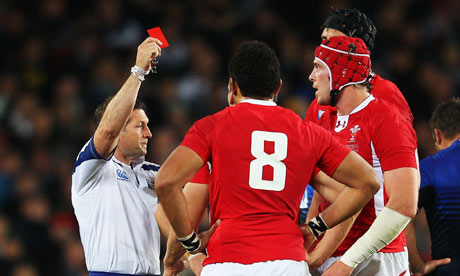
The law is clear. If you pick a player up and turn him, with your elbows pointing upwards, you have to be very careful about how you bring your victim back down to earth. Driving him head-first into the ground, with your shoulder weighing down on him, is the great taboo of rugby, up there with eye-gouging and all the rest of rugby's crimes against humanity.
What happens, though, if you realise halfway through the lift and turn that you are on your way to the completion of the dreaded spear tackle? That you must stop? And you let go? Wales's Sam Warburton picked up Vincent Clerc of France in the World Cup semi-final, turned him and then dropped him.
He did not drill him into the wet grass of Eden Park. He simply dropped him. Clerc landed on his back and his head banged against the ground. He knew it was a foul tackle and milked the moment, writhing.
Warburton knew he had done wrong, too. He waited, expressionless, for the colour of the card that he must have known was coming. Being bright, he must have suspected that it was going to be red. Alain Rolland, the Irish referee, never knowingly shies away from playing a central part on the big stage.
It was red. Warburton trudged off, expressionless. The captain of Wales, who turned 23 on 5 October, has been a beacon of common sense at the World Cup, a player of the highest quality, who has won nothing but admirers in New Zealand, where they do not readily heap praise on "loosies" (No7s), unless they are exceptional.
Moreover, Warburton has been the symbol of the new Welsh rugby player, clean-living, determined, ambassadorial. Teetotal even, which in Wales makes him almost unique. And here he was, taking the lonely walk of shame, across the field to the sideline.
He, of all people, should understand the puritanical desire to eliminate the spear tackle in rugby. It was such a tackle that did for Brian O'Driscoll's shoulder in the first Test of the 2005 Lions tour to New Zealand. Two All Blacks, Tana Umaga and Keven Mealamu, upended the Lions captain and buried him. It could have been far more serious than a dislocated shoulder, and there began a campaign to outlaw the deed, especially since the tourists' outrage and the outside world's incredulity were only deepened by the state of denial in the camp of the perpetrators.
Nobody could claim to have let the "tip" tackle slip their mind. A reminder was sent by the International Rugby Board's head of referees, Paddy O'Brien, that it should remain a foul of zero tolerance. How to deal with it? See red and only red.
The trouble is, there are degrees of spear tackle. O'Driscoll was speared and his aggressors received … nothing. Warburton tipped up Vincent Clerc, turned him, realised his mistake and dropped him. The reminder underlined the redness of the card. Referee Rolland had only one choice.
Except there is always a choice. Something should have registered with the referee other than a black-and-white regulation. This was a foul, no question, but it was not a killer tackle. It was a yellow-card offence.
There is a competition among the officials that is as intense as the games between the teams. They all want to make the final. If you lay down the law in unambiguous terms you are inviting ambition to be a more important factor on the field than a feel for the occasion. Rolland could not show compassion because it would jeopardise his chances of reffing another World Cup final. It was a pity, because his justice wrecked the occasion.
This meddling from the top has had an impact in other games. Before the quarter-finals the referees were advised to be a little more lenient at the breakdown, leading to anarchy after the tackle in Australia v South Africa and New Zealand v Argentina. The New Zealander Bryce Lawrence, who officiated in the first, has become a figure of hate in South Africa.
The laws of rugby depend as much on interpretation as implementation. Refereeing a top game of international rugby is a fiendishly difficult job, but it is not made any easier by people trying to make it clearer. Rugby is what it is, obscure and open to flexible interpretation. Sam Warburton is a victim of rigid justice.

